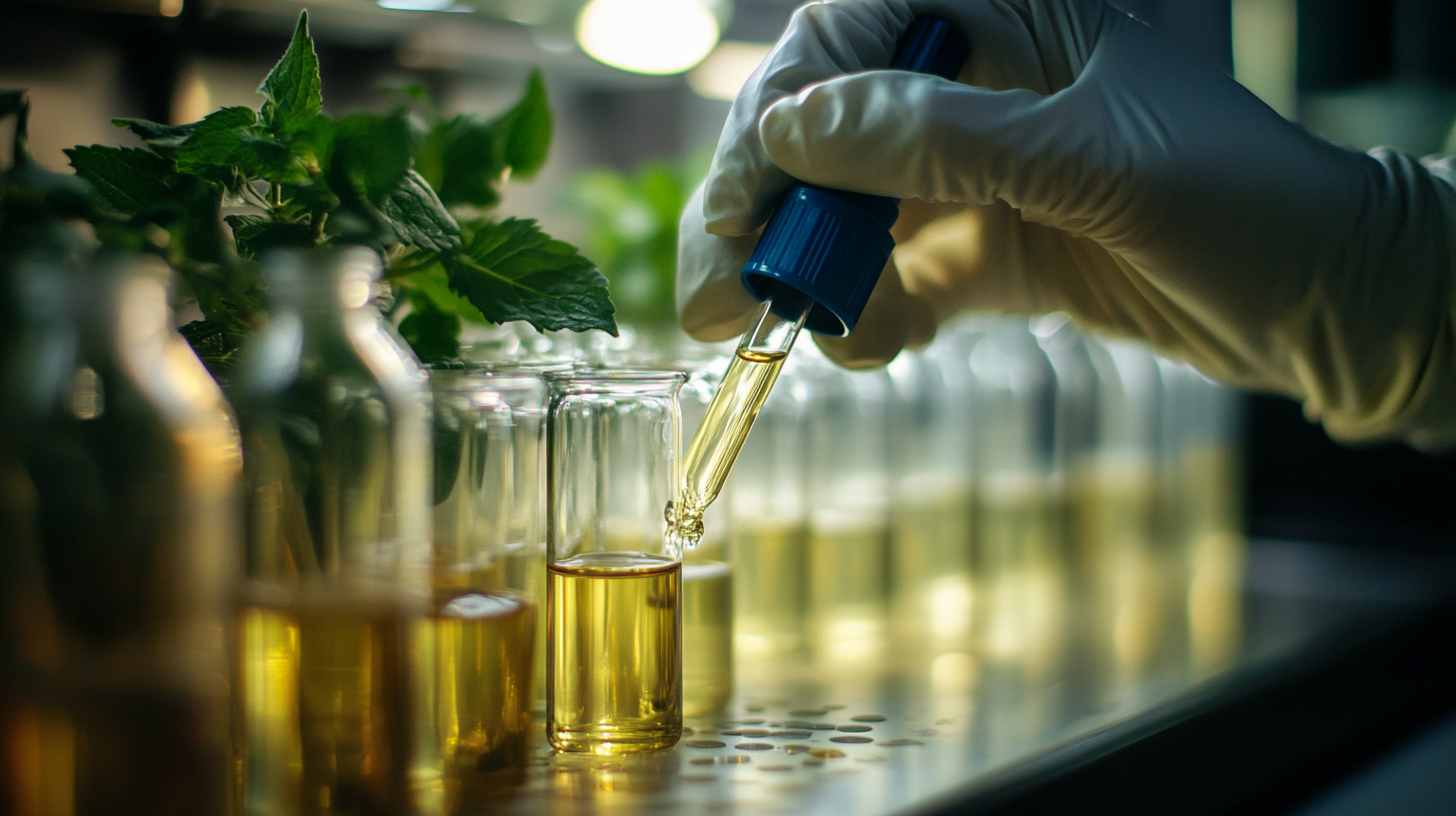50% Response rate
Unlocking the Power of Botanical Extracts for Sustainable Sourcing in Global Markets
In an era where sustainability has become a paramount concern for businesses and consumers alike, the quest for eco-friendly solutions has never been more critical. Botanical extracts have emerged as a leading choice in this movement, offering not only ethical sourcing options but also a myriad of health and wellness benefits. These natural treasures, derived from plants, encapsulate the essence of diverse ecosystems, making them invaluable in the pursuit of sustainable practices across global markets. As industries shift towards greener alternatives, understanding the potential of botanical extracts becomes essential for harnessing their full benefits while reducing environmental impact.
The versatility of botanical extracts spans various sectors, from cosmetics and pharmaceuticals to food and beverage industries. By leveraging these powerful ingredients, companies can create innovative products that resonate with environmentally conscious consumers. Moreover, the growing emphasis on traceability and transparency in sourcing further highlights the importance of botanical extracts. In this blog, we will explore how these natural resources can catalyze sustainable sourcing strategies, contribute to biodiversity conservation, and drive positive change within the global marketplace. Embracing botanical extracts not only aligns with consumer demands for sustainability but also paves the way for a more responsible economic model that benefits both businesses and the planet.

Understanding Botanical Extracts: Definitions and Benefits
Botanical extracts have gained significant attention due to their diverse benefits and applications in various industries. Understanding the definitions and advantages of these extracts is crucial for sustainable sourcing in global markets. Botanical extracts, derived from various parts of plants, such as leaves, roots, and flowers, provide a range of health-promoting compounds that have been utilized in traditional medicine for centuries. For instance, ashwagandha, known for its stress-relieving and sleep-improving properties, showcases the therapeutic potential of herbal extracts in enhancing mental well-being. The use of essential oils, such as lavender, has been recognized for their calming effects and applications in aromatherapy. Many essential oils can be used both topically and through inhalation, presenting a holistic approach to health care. A recent study highlights that the plant-to-extract ratio plays a vital role in determining the efficacy of these extracts, therefore accurate labeling becomes critical for consumer safety and knowledge. Furthermore, the potential of plant extracts in treating health conditions like anxiety and inflammation illustrates their importance in modern wellness solutions. For example, CBD-infused drinks are emerging as a promising alternative for reducing stress and promoting relaxation, underscoring the relevance of botanical extracts in today’s wellness industry. As research continues to evolve, the potential benefits of these extracts will likely expand, paving the way for more innovative applications in food, medicine, and beyond.

The Role of Sustainable Sourcing in Global Markets
Sustainable sourcing has emerged as a critical consideration in global markets, particularly in the context of botanical extracts. As companies strive to balance profit and ethical responsibility, the demand for eco-friendly and ethically sourced products continues to rise. This shift not only reflects changing consumer preferences but also underscores the importance of supporting local communities and preserving biodiversity.
Incorporating sustainable practices into sourcing strategies can significantly enhance a brand's reputation and foster customer loyalty. Companies that prioritize environmental stewardship attract consumers who are increasingly aware of the impacts of their purchases. By sourcing botanical extracts in a manner that supports sustainable agriculture and fair trade practices, businesses not only contribute to the welfare of local farmers but also ensure a stable supply chain that can withstand market fluctuations.
Moreover, sustainable sourcing is pivotal in addressing the challenges posed by climate change and resource depletion. Botanicals that are harvested responsibly contribute to ecosystem health, while also serving as a valuable resource for industries ranging from cosmetics to nutrition. As global markets evolve, embracing the principles of sustainable sourcing will be essential for companies aiming to thrive in an increasingly conscientious marketplace.

Innovative Practices for Extracting Botanical Resources Sustainably
In recent years, the demand for botanical extracts has surged, compelling industries to seek sustainable practices in sourcing these valuable resources. Innovative methods are emerging that emphasize environmental stewardship and social responsibility, paving the way for a more sustainable future. By employing techniques such as regenerative farming and wild harvesting, companies are not only preserving biodiversity but also ensuring that local communities benefit from the extraction processes.
One of the most promising practices is the integration of technology in the harvesting and processing phases. Advanced extraction techniques, such as supercritical CO2 extraction, offer a more efficient and eco-friendly approach, minimizing waste and energy use. These technologies enable producers to maximize yield while maintaining the integrity of the botanical compounds, which is crucial for high-quality end products. Furthermore, projects that focus on educating local farmers about sustainable practices can create a more resilient supply chain, promoting both ecological balance and economic stability.
As businesses continue to adapt to consumer preferences for sustainability, partnerships with local communities can bolster these efforts. Collaborative models that ensure fair trade and equitable sharing of profits create a win-win situation, motivating locals to engage in the responsible harvesting of botanical resources. This holistic approach ultimately leads to healthier ecosystems and thriving economies, illustrating that sustainability is not just a trend but a crucial component of future market practices.

Case Studies: Successful Implementation of Sustainable Extracts
The increasing demand for sustainable sourcing in the global market has led to a significant shift towards the use of botanical extracts. Recent industry reports indicate that the global botanical extracts market is projected to reach USD 50.34 billion by 2025, growing at a compound annual growth rate (CAGR) of 7.2% from 2019. This growth is fueled by various sectors including cosmetics, food and beverage, and pharmaceuticals, all of which are seeking sustainable and natural alternatives.
Case studies from innovative companies illustrate the successful implementation of sustainable botanical extracts. For instance, a renowned cosmetics brand has integrated sustainably sourced botanical extracts into its product lines, resulting in a 40% increase in sales within one year. The company achieved this by partnering with local farmers in developing countries, ensuring fair trade practices and preservation of biodiversity. This model not only enhances their product appeal but also contributes to the economic stability of the farming communities involved.
Another notable example comes from the food and beverage industry, where a leading beverage manufacturer utilized plant-based extracts to replace artificial flavors. This strategic move not only aligned with consumer preferences for cleaner labels but also reduced costs associated with synthetic ingredient procurement. According to market research, 61% of consumers are willing to pay more for products that use natural ingredients. This evidence underscores the growing importance of botanical extracts, demonstrating how sustainability can drive business growth while catering to conscious consumers in the global marketplace.
Future Trends: The Growing Demand for Eco-Friendly Botanical Products
The increasing demand for eco-friendly botanical products is reshaping the skincare market, reflecting a shift towards sustainability and health-conscious consumer behavior. As consumers become more aware of the ingredients in their beauty products, the preference for natural, plant-based alternatives is on the rise. This trend is evidenced by the projected growth of the herbal beauty products market, which is set to reach approximately USD 135,897.65 million by 2034. Such growth is driven by consumers seeking products that not only enhance their beauty but also align with their values of sustainability and environmental responsibility.
Botanical extracts play a pivotal role in this evolution, offering a wealth of benefits from natural sources that are perceived as safer and more effective than synthetic alternatives. The global botanical ingredients market is also seeing significant growth, with projections estimating it will reach USD 291.538 million by 2030, reflecting a CAGR of 7.14%. This surge indicates a robust market appetite for innovative skincare solutions that harness the power of nature.
Moreover, the organic personal care market is expected to show continued expansion, with size reaching USD 34.2 billion in 2025 and a projected CAGR of 8.4% from 2025 to 2035. This signifies that consumers are not only purchasing eco-friendly products but are also willing to invest in brands that prioritize sustainability. The landscape of skincare is indeed shifting towards a future where botanical extracts will become increasingly integral to product formulations, driving both growth and innovation in the beauty industry.
